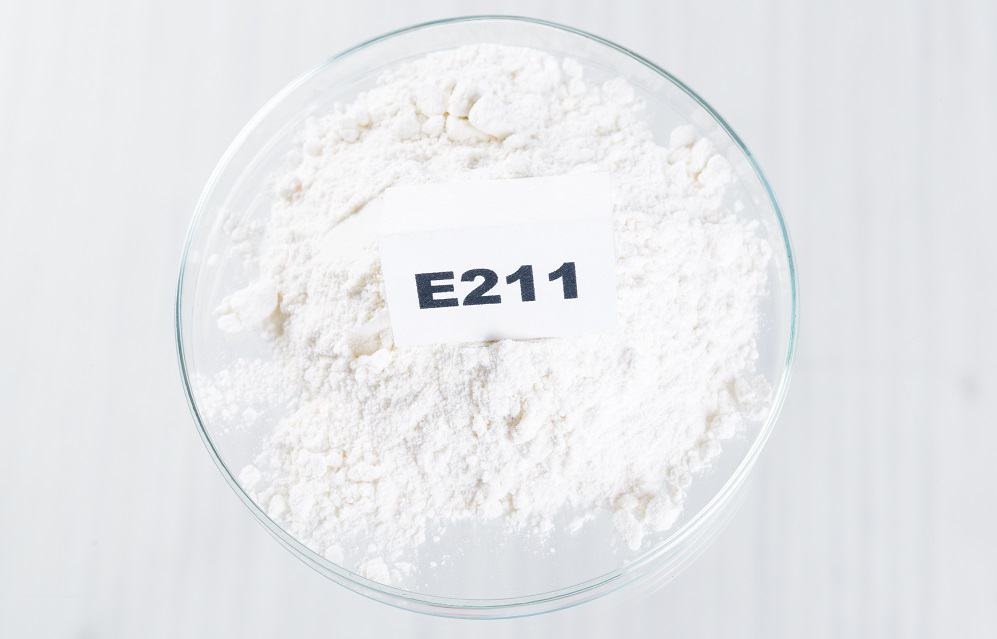A vegan diet is defined as a diet that only consists of plant-based food and drinks, and excludes all products derived from any kind of animal, or produced through a process involving animals. Sodium benzoate is laboratory produced through the mixing of benzoic acid, with sodium bicarbonate, sodium carbonate, or sodium hydroxide.
Benzoic acid is a naturally occurring compound commonly found in a variety of fruits, and spices. Sodium bicarbonate and sodium carbonate are made from carbon dioxide and water. While sodium hydroxide is synthesized by mixing pure sodium metal with water. Since these compounds are not animal derived, Sodium Benzoate is considered a vegan safe additive.
Table of Contents
What is Sodium Benzoate and Benzoic Acid?

Sodium benzoate is a synthetic compound made from the neutralization of benzoic acid by sodium bicarbonate (Baking soda), sodium carbonate, or sodium hydroxide (caustic soda or lye). This produces a white powdery substance that is 200 times more soluble than its precursor, benzoic acid(1).
Benzoic acid is the active ingredient and has antimicrobial, antifungal, and preservative properties, but is only slightly soluble in water. Due to the insolubility, it’s essential to convert it into sodium benzoate in order for proper mixture with food and drinks to occur.
Why is Sodium Benzoate Added in Food and Drinks?
Sodium benzoate is added as a form of preservative. It is used on some baked products as a way to inhibit mold which causes spoilage. In drinks, it is added to inhibit the growth of fungi, pathogenic bacteria, and spore forming bacteria that might survive the canning or bottling process.
Adding sodium benzoate to acidic drinks and fruits converts it back to benzoic acid. When benzoic acid is absorbed by microorganisms that causes fermentation, it sharply inhibits the fermentation process(2), further prolonging the shelf life of most fruits and juices.
Food that Contains Sodium Benzoate or Benzoic Acid.
Sodium benzoate does not occur naturally, it can only be produced synthetically. Since sodium benzoate is often converted back to benzoic acid when added to food and drinks, some food items may not list sodium benzoate as an ingredient, and would have benzoic acid listed instead.
Common food and drinks that contains naturally occurring benzoic acid:
- Berries
- Apples
- Plums
- Fruit juices
- Spices like cinnamon
Food and drinks that may contain sodium benzoate or benzoic acid as an additive:
- Canned and bottled juice
- Soda
- Condiments
- Vinegar
- Pickled fruits or vegetables
- Canned fruits, vegetables, or legumes
- Jams
- As an in-active ingredient in ibuprofen
Is it Safe to Consume Sodium Benzoate?
Sodium benzoate when added to food is generally recognized as safe (GRAS) by the U.S Food and Drug Administration (U.S. FDA). It was the first preservative the FDA allowed in foods(3, 4). Upon consumption of sodium benzoate and benzoic acid, it is rapidly absorbed in the stomach, and then into the circulation.
Both are rapidly conjugated with glycine in the mitochondria of cells, producing hippuric acid. This conjugate is excreted in the urine, and there has been no evidence that sodium benzoate or benzoic acid can accumulate in the body.
In rare cases, when sodium benzoate is mixed with ascorbic acid (Vitamin C) or erythorbic acid (d-ascorbic acid), and is exposed to sunlight, it produces a substance called benzene. Benzene is a known carcinogen(5, 6).
This used to be a pressing problem that affected soft drinks and other processed beverages. The FDA has been working with the beverage industry to identify, and minimize benzene formation in these products.
Ethics of Sodium Benzoate
Some vegans avoid products and additives if they are involved in processes that exploit animals.
It's well documented that Sodium Benzoate was tested on Animals. For instance Wistar rats were used and conscious animals were sacrificed by decapitation(7).
Due to this reason, ethical vegans would consider Sodium Benzoate non-vegan, where-as a dietary vegan would be okay with sodium benzoate as it is simply benzoic acid reacting with sodium hydroxide which are not comprised of animals.
References:
1. https://assets.thermofisher.com/
2. https://www.sciencedirect.com/
3. http://biotech-health.portal.tools/




